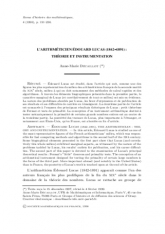L'arithméticien Édouard Lucas (1842–1891) : théorie et instrumentation
Édouard Lucas (1842–1891), the Arithmetician : Theory and Instrumentation

- Consulter un extrait
- Année : 1998
- Fascicule : 2
- Tome : 4
- Format : Électronique
- Langue de l'ouvrage :
Français - Pages : 191-236
- DOI : 10.24033/rhm.74
Édouard Lucas est étudié, dans l'article qui suit, comme une des figures les plus représentatives du milieu des arithméticiens français de la seconde moitié du xixe siècle, milieu à qui on doit notamment des méthodes de calcul rapides et des algorithmes. À travers les éléments biographiques présentés dans la première partie, le caractère marginal de Lucas (et corrélativement de tout ce milieu) est mis en évidence. La nature des problèmes abordés par Lucas, les lieux d'expression et de publication de ses résultats et ses difficultés de carrière en témoignent. La deuxième partie de l'article est consacrée à l'examen des principaux résultats théoriques de Lucas : petit théorème de Fermat et tests de primalité. La conception d'un instrument arithmétique destiné à tester mécaniquement la primalité de certains grands nombres entiers est au centre de la troisième partie. La postérité des travaux de Lucas, plus importante à l'étranger, et notamment aux États-Unis, qu'en France, est abordée en fin d'article.

